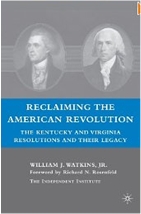Regarding Constitutional Commission
Some point-counterpoint on USC enforcement
via 'nation-statist' libertarian friend
Point
 Editor's Note: Lately I've been receiving some encouraging news from the IndictBushNow.org people: a) that Don Rumsfeld stands to be tried in a federal court for torture of American citizens and b) that Cheney is concerned that he will be 'Pinocheted' (arrested, tried, convicted, jailed somewhere outside the US), which is why he wrote a book. [Yippie! Finally, we reach the threshold of war crimes' prosecutions of leading members of the Bush administration.] Editor's Note: Lately I've been receiving some encouraging news from the IndictBushNow.org people: a) that Don Rumsfeld stands to be tried in a federal court for torture of American citizens and b) that Cheney is concerned that he will be 'Pinocheted' (arrested, tried, convicted, jailed somewhere outside the US), which is why he wrote a book. [Yippie! Finally, we reach the threshold of war crimes' prosecutions of leading members of the Bush administration.]
So I dutifully pass on such information to one of my favorite local prowar (i.e. pro any recent war initiated by the USG) libertarian friends. He's a Marine from the Vietnam era, and his first comeback to my news about American government war criminals is that we can't have anyone outside the US participating in such prosecution. His second comeback, today, is a priority over 'addressing illegal wars' is to upgrade the US Constitution (USC) with the Constitutional Commission Amendment.[1]
Counterpoint
I don't agree with you, Joe.
I'm talking about mass murder and war crimes of great magnitude, committed
by the commander in chief and his gang of Republican—would
these be RINOs, too, in your terminology?—, corporatist, globalist scum.
Bringing these men to justice—thus putting every would-be government
aggressor-murderer on notice—is a much higher priority than getting the
legal infrastructure right.
If one's wife and daughter have been taken from one's home and raped,
tortured, and murdered, how can one morally or practically neglect to seek
justice for the perpetrators, and instead busy oneself remodeling the
living room? The continued unaccountability of Bush, Cheney, Rumsfeld,
and hundreds or thousands of other murderers/torturers who acted
against the Constitution is a peak moral toxin to our country that destroys
everything else. We must face and punish these crimes, or we are
complicit in them, and our country is destroyed by them.
At first glance, I find the Constitutional Commission Amendment (CCA) you
have passed on cumbersome and
easily ignorable by the vast numbers of persons who would
need to be convinced. By contrast, the Jeffersonian idea of
consensual government—freedom of choice in government (panarchy)—is
a breeze to persuade people of. Likewise it's radical and portends a true
solution: forthright and quick replacement of the current system by one that better
'seems to effect our safety and happiness.'
Also, this CCA legal-infrastructure-change argument perpetuates what
I regard as the nation-state addiction: people clinging to the law, to
codified rules of behavior and their interpretations in the context of the
current wholly corrupt legal system. We're playing the game of the statist
controllers when we accept their premises, in this case their bought
courts and legislative goons. No thanks. I have other ideas strategically,
which I've identified in my book Breakthru Strategy.
And I'd certainly appreciate your comments. (The free PDF is located at
deaggress.org#5.)
Having stated the above, I do find agreement with CCA-related radical assertions of
individual sovereignty such as jury nullification, and, more broadly,
state-level nullification of federal enactments. These more direct and
effective initiatives, I feel, are undercut by establishing another
official legalize-wrapped institution that no one will understand or
implement properly, and therefore will simply be absorbed (ignored) in the
labyrinth of incomprehensible legal code that enslaves us now.
bw
At this point I confessed that obviously we do not share the same premises intellectually and
morally. Then mentioning that getting to those premises for resolution is difficult if they
are held with 'compulsive mentality' (CM), I stated we needed to look at getting beyond CM. I've found that
the only way to get beyond CM is through spiritual processes. And I asked him to breathe
deeply five times then perhaps begin a new discussion of where we are spiritually. I asked him, for starters, if he had read Eckhart Tolle (The Power of Now)
or looked into a cultivation practice such as Falun
Dafa/Falun Gong (clearwisdom.net). Paths to true liberation.
Upshot
What I'm really trying to get to with Joe and with everyone else is we all need to break free spiritually from the Stunted Limbic System (SLS) trap that I describe in my book, The Barrier Cloud. [The SLS syndrome is essentially a blind-obedience to authority psychology that automatically and without independent judgment yields to an authority structure one usually has grown up with—grounded in religion, politics, nation-state, family, sports idolatry—and acts according to whatever that authority structure dictates... usually through emotional-perceptual media.][2] It's a start.
[1] The Constitutional Convention Amendment (CCA), as I understand it, is the creation of one William J. Watkins, Jr., the author of a book on the Kentucky and Virginia Resolutions of 1798 and 1799 written secretly by Thomas Jefferson and James Madison, respectively. Watkins' book is entitled: Reclaiming the American Revolution: The Kentucky and Virginia
Resolutions and Their Legacy.
The following is the text of the CCA:
Section 1. The Constitutional Commission shall settle questions
presented by the several states concerning the constitutionality of
measures or actions taken by the government of the United States.
Section 2. The Constitutional Commission shall be composed of one
Commissioner from each state, elected every second year by the people
thereof from two candidates chosen by the state legislature, and the
electors chosen by the state legislature, and the electors in each
state shall have the qualifications requisite for the electors of the
most numerous branch of the state legislature; each Commissioner shall
have one vote.
Section 3. No person except a natural born citizen shall be eligible
for the office of Commissioner; nor shall any person be eligible for
the office who shall not have attained the age of 35 years, and been
14 years a resident within the United States, and been nine years a
resident of that state for which he shall be chosen. No person shall
be elected to the office of Commissioner more than four times.
Section 4. When vacancies happen by resignation, or otherwise, during
the recess in the legislature of any state, the executive thereof may
make temporary appointments until the next meeting of the legislature,
which shall choose two candidates to present to the people to fill the
vacancy.
Section 5. The Constitutional Commission shall assemble it least once
in every year, and such meeting shall begin at noon on the third day
in January, unless it shall appoint a different day. The
Constitutional Commission shall choose its Chairman and other
officers. The Commission shall be the judge of the election returns
and qualifications of its own members, and three-fourths of the
Commissioners shall constitute a quorum to do business. The
Commission may determine the rules of its proceedings. The commission
shall keep a journal of the proceedings, and from time to time publish
the same.
Section 6. No Commissioner shall receive compensation for his
services out of the Treasury of the United States. No Commissioner
shall, during his time for which he was elected, be appointed to any
civil office under the authority of the United States.
Section 7. Whenever the Chairman of the Constitutional Commission
shall receive petitions from one-fifth of the legislatures of the
several states requesting a ruling on the constitutionality of a
specific measure or action of the government of the United States, the
Commission shall convene. The act or measure of the national
government shall be void and [have] no force if three-fourths of the
Commissioners present vote against its constitutionality.
Section 8. The Constitutional Commission shall not sit as a Convention
as prescribed in Article V of the Constitution of the United States.
As I read it in a nutshell: one commissioner from each state, elected popularly from two candidates chosen by the state legislatures, two-year terms, body has the authority to rule on Constitutionality of US enacted laws when one-fifth of the state legislatures request a ruling.
[2]
By emotional-perceptual mode I'm referring to a process of consciousness that acts as a stimulus-response cycle: one sees an image and immediately has an emotion for or against. For example, an Arab man on an airplane.
###
2011 September 05
Copyright The Coffee Coaster™ and others as cited
Constitution Commission Amendment | William Watkins | US War Crimes |


